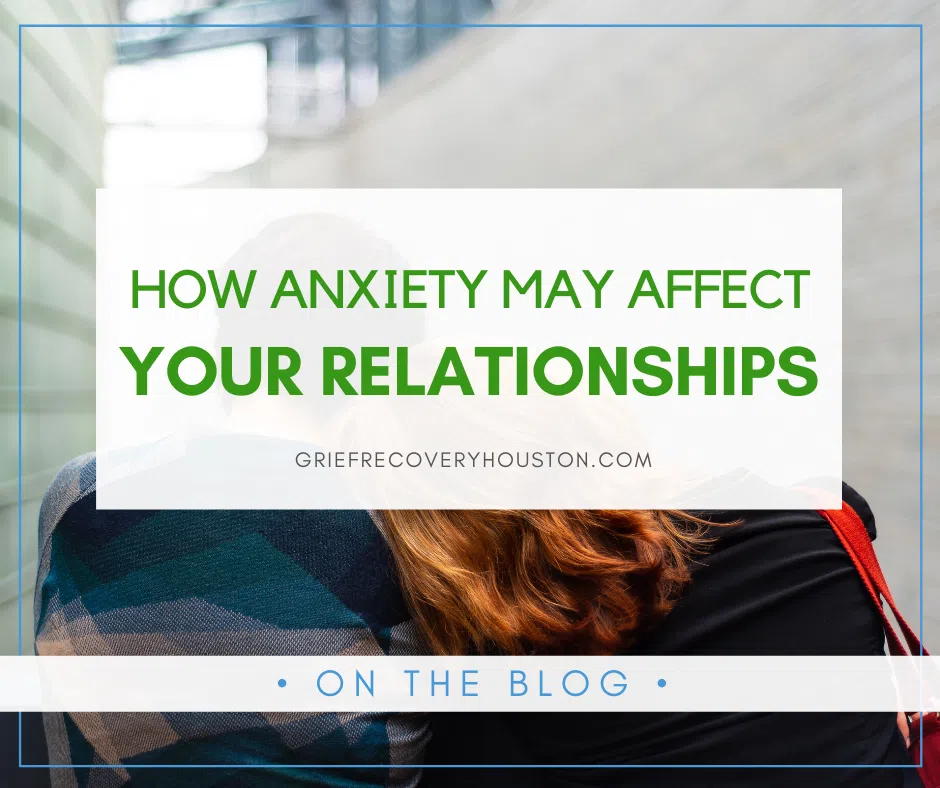- Unpacking Grief and Disability - July 8, 2024
- Breaking the Stigma: 5 Blogs to Better Understand Suicide - May 21, 2024
- 4 Tips for Better Sleep Hygiene - March 4, 2024
 When you’re in the midst of grief, it can feel like you’re not in control of anything in your life. That’s a scary feeling. Grief can be a reminder that we don’t have control over as much as we might want to. Grief can also make us feel profoundly unsafe. Grief and anxiety often go hand in hand, but anxiety is one aspect of grief that’s not always talked about.
When you’re in the midst of grief, it can feel like you’re not in control of anything in your life. That’s a scary feeling. Grief can be a reminder that we don’t have control over as much as we might want to. Grief can also make us feel profoundly unsafe. Grief and anxiety often go hand in hand, but anxiety is one aspect of grief that’s not always talked about.
Most people know the classic symptoms of grief, which can include numbness, sadness, irritability, fatigue, low motivation or interest, and changes in sleeping or eating patterns. Those aren’t the only ways that grief can manifest mentally and physically, though. People who are grieving may also be more susceptible to getting sick, experience decreased confidence, and even feel an increase in anxiety.
Grief is a part of life
Grief comes up when we experience a major change in our day to day lives. It can be the death of someone you care about, moving to a new city, or even ending a friendship. One particularly painful aspect of grief is trying to prepare yourself for future grief. No one likes to be in pain, so when we experience the pain of grief, we want to do everything we can to avoid that pain in the future. However, grief is unavoidable in life. We’re all going to feel it, and probably more than once.
Going out of your way to prevent yourself from feeling grief again makes sense when  you’re reeling from grieving, but it can lead to a preoccupation that ultimately causes more distress. Trying to protect yourself from future grief also likely means that you will be missing out on some of the things that make life worth living like close relationships with others.
you’re reeling from grieving, but it can lead to a preoccupation that ultimately causes more distress. Trying to protect yourself from future grief also likely means that you will be missing out on some of the things that make life worth living like close relationships with others.
Sometimes, anxiety comes from a place of self-protection. Grief-Related Anxiety can make us feel like we’re taking back some of the control that was taken away from us.
Why does anxiety often show up with grief?
Intense emotions, like grief, can make us feel vulnerable. A sudden loss or change can leave you feeling more aware than ever of your own mortality or the fact that life is short. The truth is, life isn’t something we can always predict. Most of the time, we accept that, but in times of heightened vulnerability, that lack of predictability can be distressing. When we feel out of control, we automatically try to do what we can to take back some measure of control, even if it’s not rational.
What does this mean when it comes to grief? This can look like being overly worried about your surviving loved ones. You might be even more scared for something bad to happen in the future because you know how painful it is. You might be afraid of getting caught off guard, and feeling anxious helps you feel like you’re able to do something about it. Also, many situations that can cause grief are traumatic in nature. After experiencing trauma, it’s normal for anxiety to show up, even in ways you aren’t expecting or haven’t experienced before.

 What can I do about grief-related anxiety?
What can I do about grief-related anxiety?
If you’re experiencing grief-related anxiety, there are some things you can do to make things easier for yourself. Here are 5 ways to cope with grief-related anxiety:
Take it easy on yourself
First, remember to be kind to yourself. You’re going through something that’s really difficult, and you’re doing the best that you can right now. Treat yourself like you’d treat your best friend in this situation. When you notice your inner critic getting carried away with criticism, interrupt it and try some positive self-talk. If you need to be reminded, write down some favorite affirmations and stick them up someplace you can see regularly. Remember, this won’t always feel so intense. Give yourself time.
Practice good self care
This can be the last thing you feel like doing when you’re grieving, but taking care of yourself is essential. Make sure you’re eating regularly and drinking enough water. Take your medicine if you have any prescribed. Make time to get outdoors every day, even if it’s just for a five minute walk down the street. If you’re struggling with sleep, see what you can do to improve your sleep routine, like shutting down electronics a few hours before bed or keeping your bedroom on the cooler side. There are lots of ways to problem solve sleep issues, so if there’s something that is keeping you from getting a good night’s rest, see what you can do to lower that obstacle for yourself.
Living with anxiety and depression can be isolating, but our Houston TX, anxiety support group is here to help. We provide a warm and welcoming community where you can find hope, strength, and a sense of belonging. You don’t have to face these challenges on your own. By joining our support group, you’ll connect with others who understand and are ready to support you in your journey toward healing. Join us today and experience the power of community.
Move your body
Anxiety can feel like a lot of uncontrollable energy, and one way to work through that is to move your body. Movement and exercise are a natural way of expressing some of that anxious energy. Have you ever seen a dog shake itself off after a stressful moment? They’re literally shaking off the stress. You can do the same! You don’t need to do anything intense of punishing to reap the benefits of moving your body around. Moving your body in a way that you don’t normally gives you a distraction when you’re feeling distressed, and it can help take your mind off things for a moment. Try putting on a playlist and dancing, walking around the closest park you can find, or play with a pet for a while.
Forgive yourself
One reason grief is so hard is it’s often final. Grief can mark the end of something, and so it’s hard to go back and forgive yourself or the other person involved, especially if they’re someone who has passed away. It can be all-consuming to regret how you left things with someone or to wonder what would have happened if things had been different. Whatever happened, do what you can to forgive them and yourself. Forgiveness doesn’t have to be about accepting someone hurting you, but rather about releasing yourself from the emotional burden of the situation. What can you do to make peace with the situation for yourself?
Get your thoughts out
Sometimes anxiety can feel like the volume in your brain is turned way up or there are multiple channels playing at the same time. The overwhelming nature of anxiety means that it can often leave you in a thought spiral or dwelling on something that isn’t helpful. One way to help clear out the different thoughts is to write down what you’re feeling in a journal. If writing isn’t your thing you can even talk to yourself in a voice memo on your phone. Getting the thoughts out in some way can help quiet the sense of anxious urgency in your brain.
Are you dealing with grief-related anxiety?
Working with a qualified grief therapist can help support you through the grieving process and anxiety management while protecting your mental health as much as possible. Grief is hard enough, you don’t have to go through it alone. Reach out to our office to schedule an appointment with a grief counselor today.






How interesting that anxiety can come with grief a lot of times. I lost my husband last week. I will find a reputable grief support service nearby.